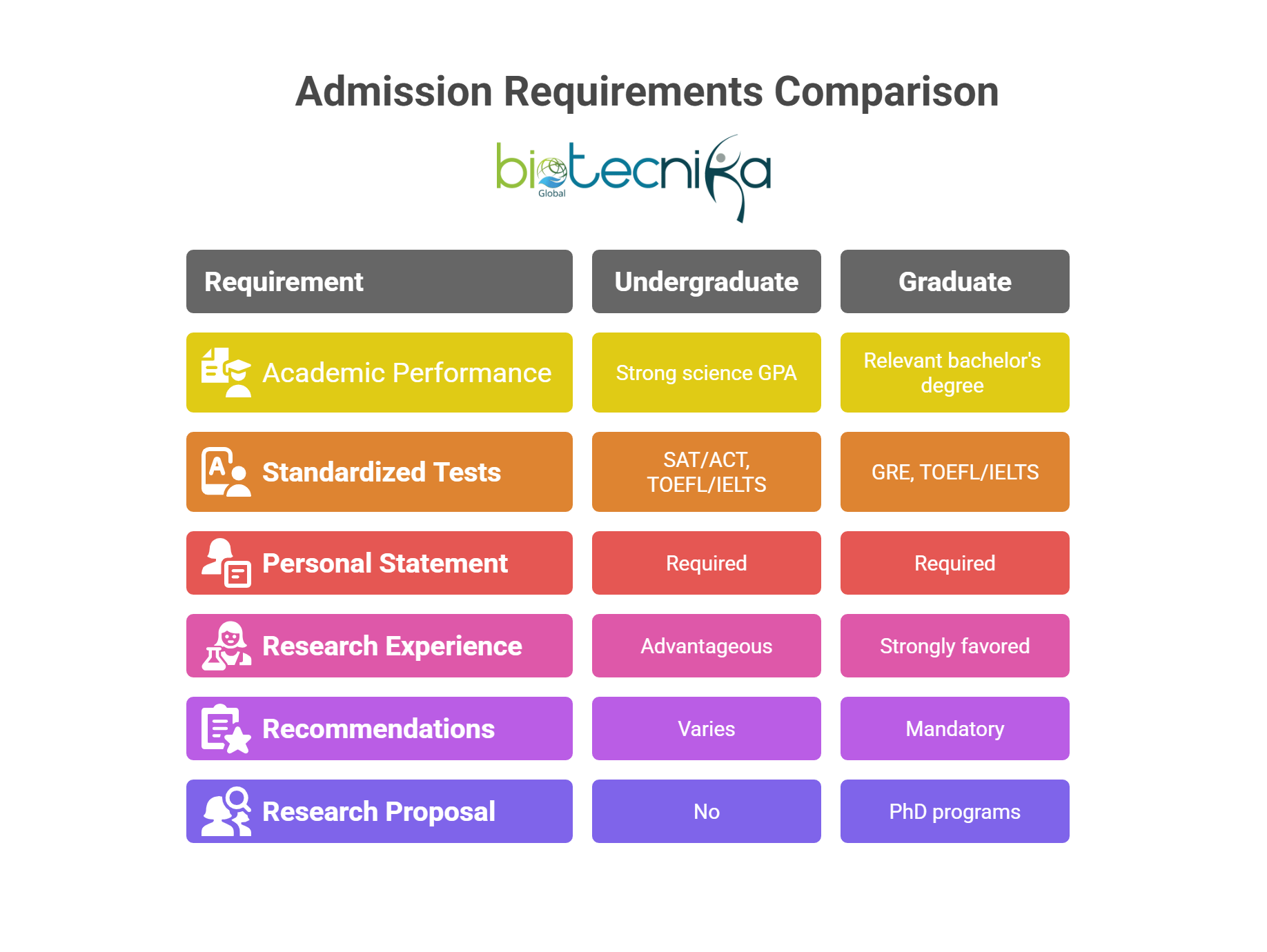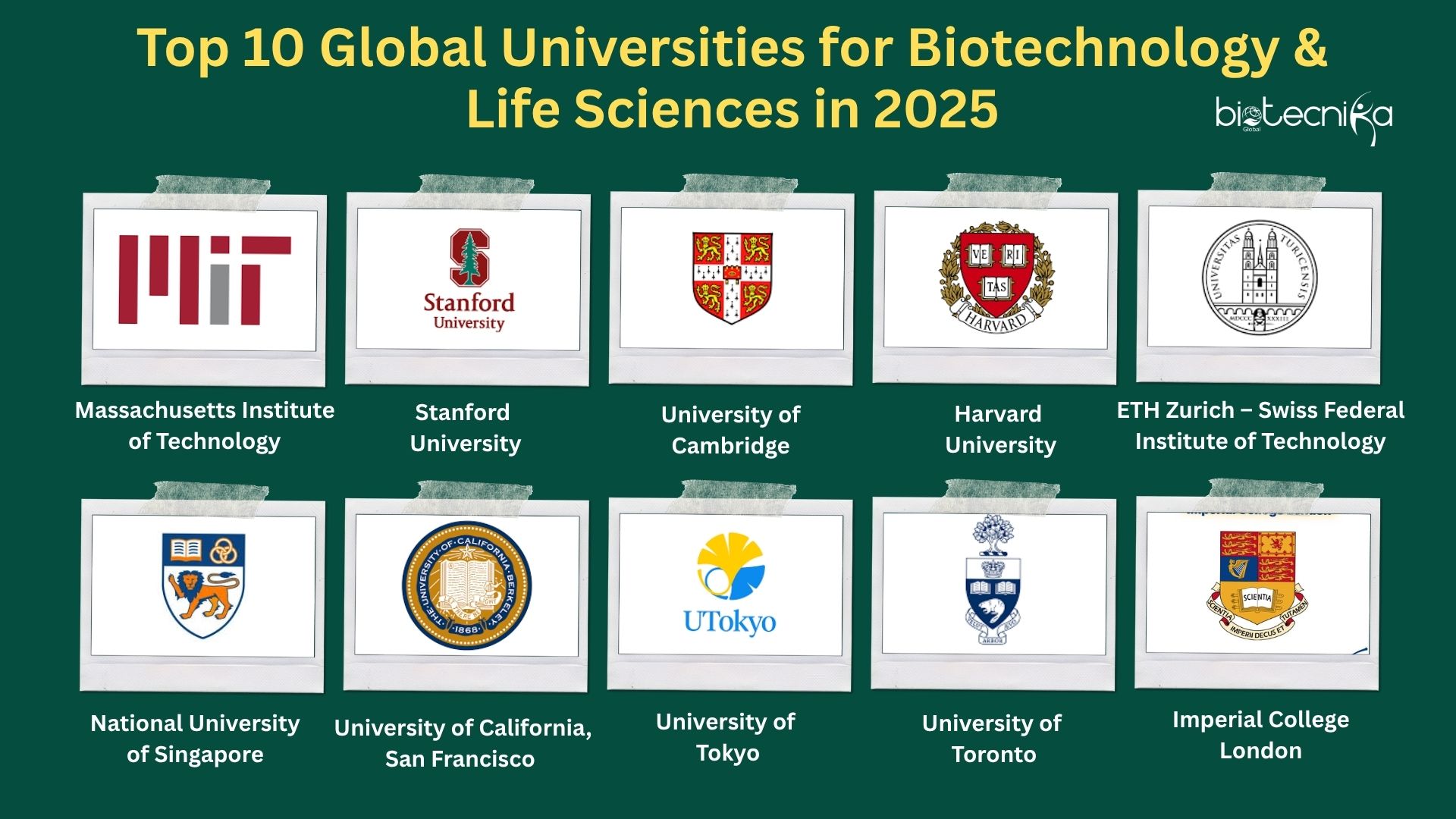Best Global Universities For Biotech and Life Sciences in 2025
Biotechnology and Life Science are shaping the future of Personalized Medicine, Agriculture, and Environmental Sustainability. With the advances in innovations such as CRISPR, Personalized Medicine, and Biofuels, the need for skilled professionals in this field is growing rapidly.
If you are looking to enter this exciting field, choosing the right university is important. Choosing the best Global Universities for Biotech not only provides top-tier education but also opens doors to government research laboratories, industry partnerships, and international career opportunities.
Explore the top 10 global universities setting the benchmark for the best global universities for Biotech in 2025, and how to join them.
- Massachusetts Institute of Technology (MIT), USA
a. Why It Stands Out: MIT is a global leader in Biological Engineering and consistently ranks among the best global universities for Biotech, offering access to premier research centers such as the Whitehead Institute and the Koch Institute. Located near Boston’s Biotech corridor, it provides students with unmatched industrial exposure and collaborative opportunities.
b. Key Programs: MIT offers a top-ranked Biological Engineering program at both undergraduate and graduate levels. Courses integrate Molecular Biology, Computation, and device engineering to solve real-world Biotech problems.
c. How to Get Admission
- Undergrad: High GPA, SAT/ACT (optional), strong science background, standout essays
- Graduate: Research experience, academic references, GRE optional
- Stanford University, USA
a. Why It Stands Out: Stanford combines Life Science with Data Science and Entrepreneurship. Its proximity to Silicon Valley gives students access to internships, a biotech accelerator, and investment networks.
b. Key Programs: Stanford University also offers programs in Bioengineering informatics, known for integrating Biology with Artificial Intelligence, Machine Learning as well as wearable diagnostics.
c. How to Get Admission
- Undergrad: Excellent GPA, strong STEM background, extracurricular projects
- Graduate: Faculty match, research interest alignment, statement of purpose
- University of Cambridge, UK
a. Why It Stands Out: Cambridge is internationally respected for its biological sciences and historic scientific breakthroughs. Students are involved in world-class research from their first day.
b. Key Programs: Undergraduates follow the Natural Sciences Tripos with a biotechnology focus. Postgraduates can pursue an MPhil in Biotechnology or research-focused PhDs in genetics and molecular biology.
c. How to Get Admission
- Undergrad: A-levels/IB with biology and chemistry, UCAS application, entrance assessment
- Graduate: Strong academic track record, research proposal, references
- Harvard University, USA
a. Why It Stands Out: Harvard consistently ranks among the best global universities for Biotech due to its focus on biomedical research and partnerships with MIT and the Broad Institute.
b. Key Programs: Harvard offers an undergraduate AB in Molecular and Cellular Biology, a Master’s in Biotechnology, and a PhD in Biological and Biomedical Sciences that emphasize innovation in genomics and personalized medicine.
c. How to Get Admission
- Undergrad: Academic excellence, science Olympiads/research projects, essays
- Graduate: Clear research goals, lab experience, strong reference
- ETH Zurich – Swiss Federal Institute of Technology, Switzerland
a. Why It Stands Out: ETH Zurich is Europe’s top institution for scientific innovation, with a focus on sustainability, synthetic biology, and industrial biotech.
b. Key Programs: Candidates can enroll in the MSc in Biotechnology. MSc in Molecular Health Science, or pursue a PhD in interdisciplinary Bioscience. The offered programs mainly focus on Bioengineering, Microbiology, and Systems Biology.
c. How to Get Admission
- Master’s: Bachelor’s degree in life sciences or engineering, TOEFL/IELTS
- PhD: Faculty acceptance, research proposal
- National University of Singapore (NUS), Singapore
a. Why It Stands Out: NUS is Asia’s biotech education leader, combining government support, industry partnerships, and global collaborations.
b. Key Programs: NUS offers a BSc in Life Sciences with biotech specialization, an MSc in Biotechnology, and a PhD in Biomedical Sciences. The offered courses are perfectly designed to align with the current needs of the Biotechnology Industry.
c. How to Get Admission
- Undergrad: Competitive grades in biology and chemistry, English proficiency
- Graduate: Relevant bachelor’s, research statement, IELTS/TOEFL
- The University of California, San Francisco (UCSF), USA
a. Why It Stands Out: UCSF is a research-only graduate school, renowned for its innovations in biotechnology and clinical applications. It is located in a vibrant biotech ecosystem in San Francisco.
b. Key Programs: UCSF offers a PhD in Biomedical Sciences and a Master’s in Translational Medicine, focusing on converting lab research into therapies and diagnostics.
c. How to Get Admission
- Graduate Only: Strong academic track record, research publications, motivation statement
- University of Tokyo, Japan
a. Why It Stands Out: The University of Tokyo offers strong Bioscience and Biomedical programs, emphasizing gene therapy, regenerative medicine, and Applied Biotechnology.
b. Key Programs: The university offers undergraduate and graduate programs in Biotechnology, Medical Sciences, and Biological Sciences, providing access to state-of-the-art research laboratories.
c. How to Get Admission
- Undergrad & Grad: Academic excellence, TOEFL/Japanese proficiency, recommendation letters
- University of Toronto, Canada
a. Why It Stands Out: Recognized as one of the world’s top universities for Biotechnology, the University of Toronto boasts a strong research infrastructure and robust industry connections.
b. Key Programs: The University of Toronto offers a BSc in Biotechnology, an MSc/PhD in Molecular Genetics, and interdisciplinary courses at the Donnelly Centre, with a focus on molecular systems and genome editing.
c. How to Get Admission
- Undergrad: High school diploma with biology/chemistry, TOEFL/IELTS
- Grad: Statement of purpose, references, lab background
- Imperial College London, UK
a. Why It Stands Out: Imperial is known for combining both science and entrepreneurship, preparing students for careers in research, policy, or biotech business.
b. Key Programs: Imperial offers a BSc in Biotechnology, an MSc in Applied Biosciences and Biotechnology, and PhDs in Life Sciences. Programs involve practical lab work and exposure to commercial biotech practices.
c. How to Get Admission
- Undergrad: A-levels or equivalent with a strong science focus, UCAS application
- Grad: Honours degree, English test scores, SOP\

With dedication, a solid academic foundation, and early planning, your admission into one of the best global universities for Biotech is within reach. Start preparing today, align your interests with each school’s strengths, and let your passion for innovation guide the way.







